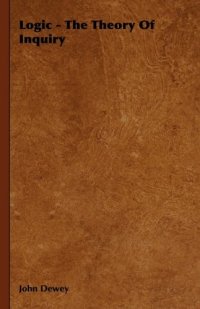
Ebook: Logic - The Theory of Inquiry
Author: John Dewey
- Year: 1938
- Publisher: Henry Holt
- Language: English
- pdf
LOGIC THE THEORY OF INQUIRY By JOHN DEWEY. Originally published in 1938. PREFACE: THIS BOOK is a development of ideas regarding the nature of logical theory that were first presented, some forty years ago, in Studies in Logical Theory that were somewhat expanded in Essays in Experimental Logic and were briefly summarized with special reference to education in How We Think While basic ideas remain the same, there has naturally been considerable modi fication during the intervening years. While connection with the problematic is unchanged, express identification of reflective thought with objective inquiry makes possible, I think, a mode of statement less open to misapprehension than were the previous ones. The present work is marked in particular by application of the earlier ideas to interpretation of the forms and formal relations that constitute the standard material of logical tradition. This in terpretation has at the same rime involved a detailed development, critical and constructive, of the general standpoint and its under lying ideas. In this connection, attention is called particularly to the principle of the continuum of inquiry, a principle whose importance, as far as I am aware, only Peirce had previously noted. Application of this principle enables an empirical account to be given of logical forms, whose necessity traditional empiricism overlooked or denied while at the same time it proves that the interpretation of them as a priori is unnecessary. The connection of the principle with generalization in its two forms which are systematically distinguished through out the work and with the probability coefficient of all existential generalizations is, I suppose, sufficiently indicated in the chapters devoted to these topics. The basic conception of inquiry as de termination of an indeterminate situation not only enables the vexed topic of the relation of judgment and propositions to obtain an ob jective solution, but, in connection with the conjugate relation of observed and conceptual material, enables a coherent account of the different propositional forms to be given. The word Pragmatism does not, I think, occur in the ext. Perhaps the word lends itself to misconception. At all events, so much misunderstanding and relatively futile controversy have gathered about the word that it seemed advisable to avoid its use. But in the proper interpretation of pragmatic, namely the func tion of consequences as necessary tests of the validity of proposi tions, provided these consequences are operationally instituted and are such as to resolve the specific problem evoking the operations, the text that follows is thoroughly pragmatic. In the present state of logic, the absence of any attempt at sym bolic formulation will doubtless cause serious objection in the minds of many readers. This absence is not due to any aversion to such formulation. On the contrary, I am convinced that acceptance of the general principles set forth will enable a more complete and con sistent set of symbolizations than now exists to be made. The absence of symbolization is due, first, to a point mentioned in the text, the need for development of a general theory of language in which form and matter are not separated and, secondly, to the fact that an adequate set of symbols depends upon prior institution of valid ideas of the conceptions and relations that are symbolized. With out fulfilment of this condition, formal symbolization will as so often happens at present merely perpetuate existing mistakes while strengthening them by seeming to give them scientific stand ing. Readers not particularly conversant with contemporary logical discussions may find portions of the text too technical, especially perhaps in Part III...
Download the book Logic - The Theory of Inquiry for free or read online
Continue reading on any device:

Last viewed books
Related books
{related-news}
Comments (0)